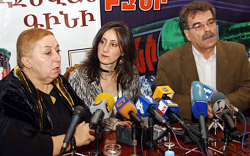For some reason, the debate between Alvard Petrosyan and Hakob Movses began rather strangely with the question “is it good or bad to award a Turkish writer with a Nobel Peace Prize?” It seemed as though the Nobel Peace Prize committee is getting ready to get the public opinion of Armenia.
It turned out that the two speakers weren’t familiar with the books written by Turk writer Orhan Pamuk nor had they read any of them, but Hakob Movses said that he had read some analogies on the books written by Orhan Pamuk, including the opinions of Peter Handke and John Apdayk about Orhan Pamuk:
“I’m sure that the Turks can’t create good literature; there may be one or two well-known writers, but there just can’t be literature,” he said and added that that’s genetically given and the Turks don’t have it in them. H. Movses considers the Nobel Prize given to Pamuk as a good thing because, according to him, this gives the Turks a chance to become civilized. Alvard Petrosyan suggested going deeper into the topic and said that they didn’t’ give Orhan Pamuk the prize for his contribution to world literature, but rather they took into consideration his attitude towards Armenians and for remembering the fact that there has been Armenian Genocide. “That’s a political award”. But according to various presses, the prize committee has appreciated Pamuk’s “loyal love towards his Istanbul”. However, Alvard Petrosyan, who is against “adoring the small things”, “the deformations from the outside”, “slavery” and the “circus of bread”, says: “I don’t believe that the Turks can have good literature; they simply have many publishing houses.”
The strange opinions expressed by Armenian intellectuals get us to thinking. It turns out that you can talk about something that you don’t know about, express your opinon about the given writer whose books you haven’t even read. Alvart Petrosyan is talking about “freeing ourselves from searching for the nucleus”, “cultural theft” and the danger of critical analyses, she places emphasis on the fact that culture must be in the hands of the people and hopes that “new Armenians will come into light”, but all of that is nothing when she starts talking about something that she knows nothing about. Considering Moscow as a pro-slavery country and France as the country drawing its attention to Armenians (after the French Senate’s approval of the bill penalizing anyone who denies the Armenian Genocide), she calls on everyone to have dignity, to not consider the homeland as a “distant land” and not be under the influence of foreign powers. What’s interesting is that Orhan Pamuk presents the same conflict between the East and the West in a more dignified, beautiful and poetic style, just like the writer/intellectual that battles with the old and the new is supposed to do.
Owned or without an owner?
Both speakers couldn’t circumvent issues concerning Armenian culture today and wanted to talk about the bad taste of Armenians. “The umbilical cord of culture has been cut off.” This is what Alvard Petrosyan said about modern-day Armenian culture and Hakob Movses continued with the same imaginary wording. “We are out of the universe”. A. Petrosyan is certain that the government has to stand up for the national culture of Armenia, while H. Movses says that culture has to pave the path on its own. Petrosyan is in favor of “creating taste standards”; she wishes to see Anush and Inga Arshakyan as the primary cultural figures of Armenia and considers painter Henry Elibekyan as an “anti-national” painter. She considers the creation of norms and the application of those norms as the only savior. “I’m sorry that we have found ourselves in a destruction zone due to the indifference of the government”. As to who is in favor of creating those norms, what the norms are, why those norms and not the norms of someone else, Petrosyan didn’t say:
Hakob Movses is against looking at the government as the savior of culture; he is in favor of having cultural institutions not depend on the government. “We Armenians still don’t know how to present culture. Do we really need an Academic Theatre, or let’s say, a street play or pantomime?” He is criticizing all that makes up culture, the ways of managing theatrical groups, which played during the Soviet era. He states that culture must be managed. “The government can also manage culture,” protested A. Petrosyan. H. Movses replied: “No, it can’t because the government protects its interests during the elections and culture is the last thing that the authorities think about.” However, cultural figures become pro-government. Finally, everyone gets what he or she wants. “We consider standing up for culture by financing, we want money, rankings and prizes,” said H. Movses. According to him, even if they give 10 million dollars to the Sundukyan and Dramatic theatres, nobody is going to be that naïve to think that there will be masterpieces from now on. There won’t be because there are no conditions to make imagination and taste go together; no director who has been managing a theatre for years will give the theatre to a talented young person. The change in the model of the work done by cultural institutions may start only after culture doesn’t depend on the government. It’s then that the surfaced, simple-minded and temporary layer of culture will start to fade away, or will start demanding because the norms will come on their own. But nobody needs a culture with an artificial umbilical cord.

